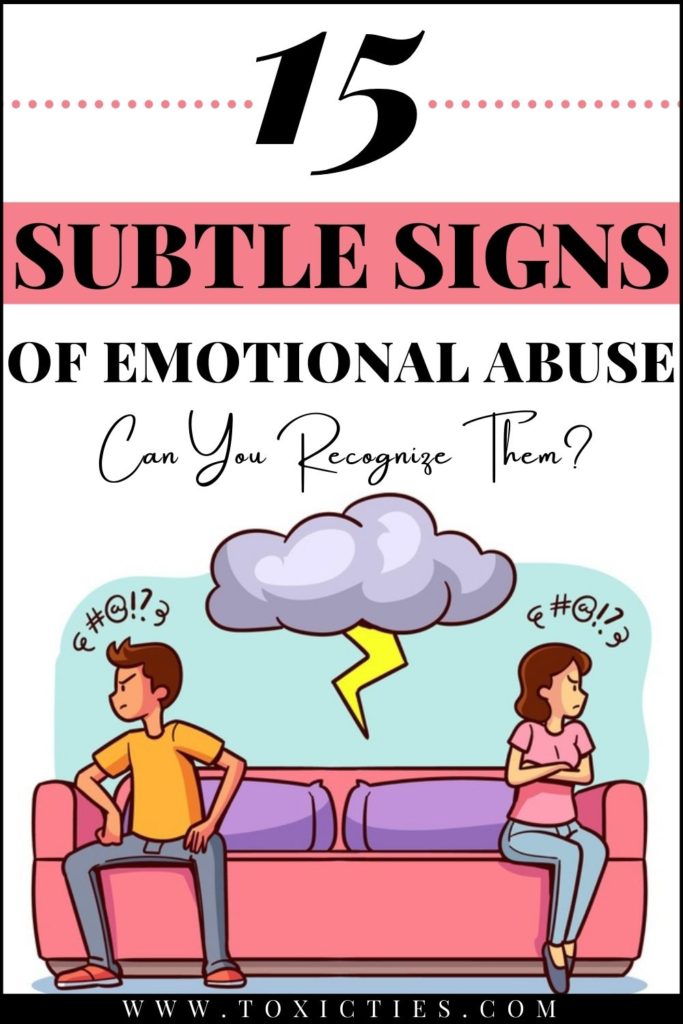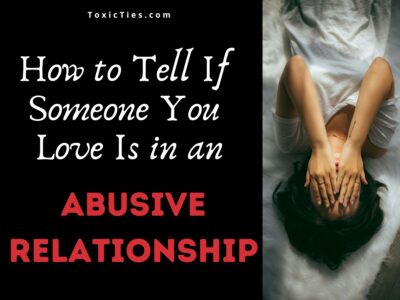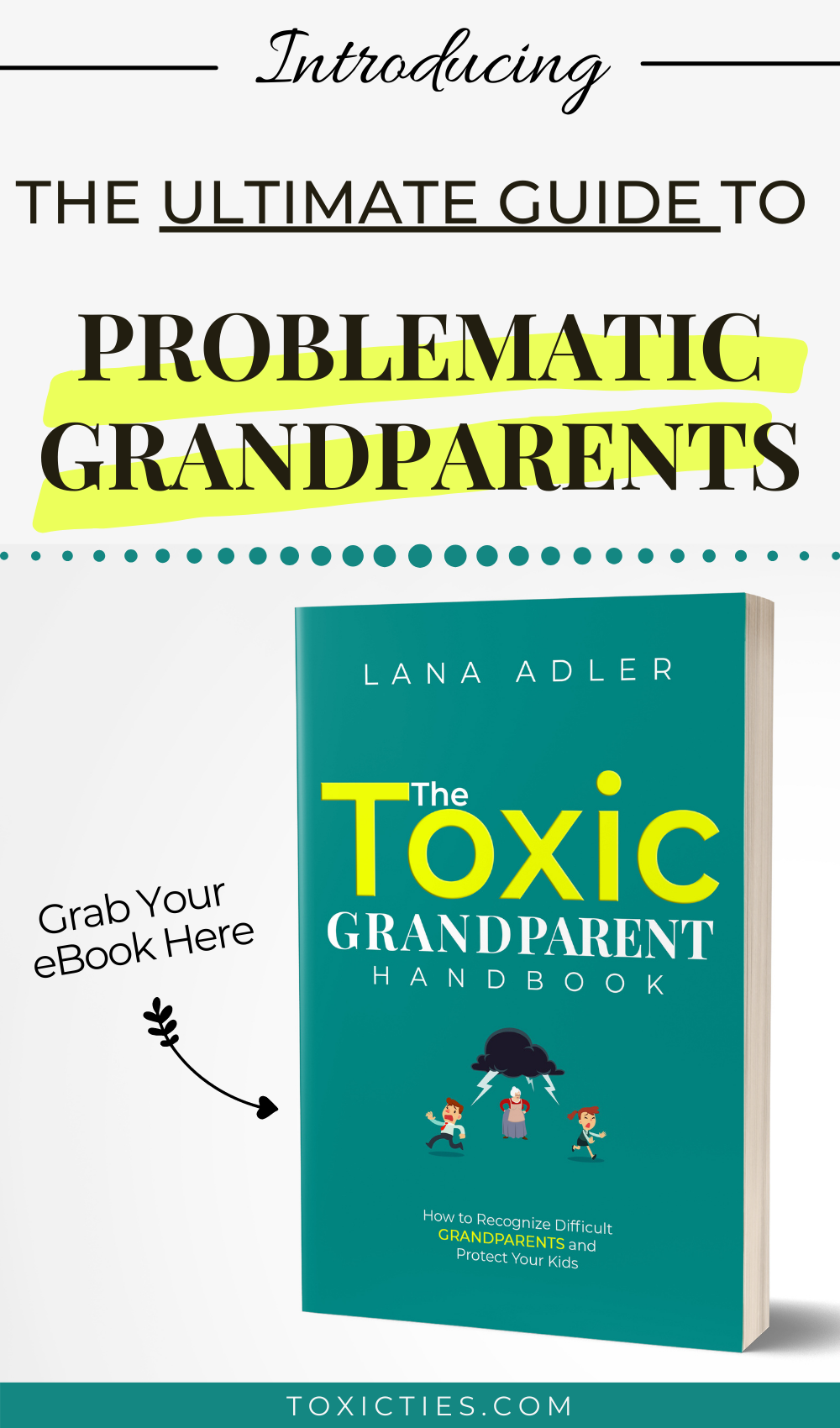The danger of toxic relationships is that it’s not always obvious they’re toxic. The abuse can be subtle and continue for years or even decades. So how do you recognize the signs of emotional abuse in what seems like a normal relationship?
First, listen to your gut.
- Does something feel wrong?
- Does your partner make you feel loved and secure or anxious and uncertain?
- Do you feel that your needs are important to them?
- Do you feel that this is a relationship of equals?
Next, see if you can recognize these subtle signs of emotional abuse.
1. Being Dismissive
Being dismissive is when your partner isn’t listening or validating your thoughts and feelings.
For example, you’ve had a hard day and you’re telling your partner about it. They go: “Oh, that’s nothing. Listen to the day I’ve had.”
Or you’re telling your partner about your feelings, and they say: “That’s stupid. There’s no reason to feel this way” or “Just get over it.”

2. Insulting nicknames
Almost every couple has sweet or funny nicknames for each other — from simple “honey” or “baby” to the special ones only known to the two of you.
But in toxic relationships, “pet names” are more nasty than cute.
For example, if your partner calls you
- fatty
- slut
- idiot
- stinky
- muffin top
- douchebag
- Lazy Susan
- Messy Bessy
- Teletubby
- chubby cheeks
- crater face
- pork chop
it may be verbal abuse.
I say “may be” because these things are subjective. To some, “baby” is offensive. To others, “idiot” is a term of endearment. So if you’re not sure, ask them to stop calling you the nickname you dislike.
If they dismiss your feelings with “Oh, I’m just kidding! Stop being so sensitive” or “But I say it with love,” it confirms that their “affectionate” pet name is one of the signs of emotional abuse.
3. Spying and monitoring
Does your partner demand to know where you are at all times? Did you ever catch them spying on you via social media or digital devices?
It’s safe to say it’s emotional abuse. Here’s why.
Spying and monitoring your whereabouts is an invasion of privacy and a violation of trust. By “keeping tabs” on you, your partner disregards your rights and lets you know that they don’t trust you.
If you catch them spying, they’re likely to turn the tables on you. They’ll accuse you of cheating and put you in the position of having to defend yourself.
This way they change the conversation from “It’s not OK that you’re spying on me” to “You’re untrustworthy so I have to spy on you.”
They may tell you that it’s for your own good, or that they’ve been worried about you, or my personal favorite: “It’s not you I don’t trust, it’s the other men (women).”
That’s not proof that they love you. That’s emotional abuse.

4. Patronizing
Being treated in a patronizing way is when your partner talks down to you.
It’s a subtle form of emotional abuse because he or she is not calling you stupid (not directly anyway) but they’re acting in a way that makes you feel inferior or less intelligent.
They’re pretending to be “friendly” or helpful while actually insulting you.
For example, they might use a condescending tone or ask questions that imply that you’re uninformed or incompetent (“Do you know where Canada is?” or “Do you need help with that job application?”)
When men patronize women, it’s called “benevolent sexism” or “mansplaining.”
5. Pushing your buttons
When your partner intentionally does things to provoke an emotional reaction from you, they’re pushing your “buttons.”
Toxic people (such as narcissists, psychopaths, etc.) have a knack for finding your insecurities or emotional “hot buttons” and exploiting them.
Some do it to cause drama and chaos, others — to demonstrate their control over you.
In extremely dysfunctional, toxic relationships both partners will do it to each other because it’s the only way for them to feel loved. To these damaged individuals, fighting is an easy and obvious way to get attention and stoke the flames of passion.
But even if the “button-pushing” is mutual, it’s still emotional abuse.
6. “Joking” or sarcasm
Insulting you and calling it a joke is one of the most recognizable forms of emotional abuse known as “gaslighting.”
The danger of this type of abuse is that it’s so easy to deny. A joke can cut deep, especially if it’s made publically, and your partner can just brush it off with “I was only kidding” or “Can’t you take a joke?”
As a result, you don’t just feel hurt and embarrassed; you feel invalidated. It’s as if your partner tells you: How you feel doesn’t matter since it was a joke.
Joking or teasing can be fun and playful. But in a toxic relationship, it’s a way to demean and belittle another person.
If your partner regularly attacks your appearance, weight, habits, or capabilities by making jokes or sarcastic comments, it’s emotional abuse, whether they’re aware of it or not.

7. Jealousy
A little jealousy is OK. It’s even healthy. But when your partner acts like he or she owns you, or always assumes the worst of you, it’s emotional abuse.
For example, when you go to a party together, they’ll make sure that everyone knows you’re together. If they see you talking to someone, they’ll come up and put their hand around you in a possessive way. They’ll even try to control who you’re friends with.
In severe cases, a toxic partner will fly into a jealous rage every time they believe you “humiliated” them and make you paranoid about even glancing at another man (woman).
The result? You feel like you are always under a microscope, and that your partner is like a mean detective who’s determined to find evidence of infidelity in any social interaction you have.
That’s toxic and exhausting for both partners.
8. “Tuning out”
“Tuning out” sabotages the very foundation of a healthy relationship: communication.
It’s when you’re talking to your partner but you feel like you’re talking to a brick wall.
Tuning out can happen from time to time when emotions are running high or when the partner feels nagged.
But if every time you open your mouth your partner gets a glassy look in their eyes and starts scrolling through their phone, it’s emotional abuse.
Tuning out is also known as stonewalling — the practice of emotionally withdrawing from a conversation, becoming unresponsive, distracted, and acting cold and indifferent.
Relationship guru John Gottman calls stonewalling one of the “Four Horsemen” that predict the couple breaking up. The other three are criticism, contempt, and defensiveness.

9. Interrupting
Interrupting is a terrible habit and my personal pet peeve.
If you want to communicate that you don’t care about what your partner has to say, go with interrupting. The message couldn’t be any clearer.
I know in the heat of an argument we all want to get our point across as quickly as possible. We are also very reactive to our partner’s words so we jump in to defend ourselves without listening to the end.
Interrupting happens. But if your partner is always cutting you off, they’re sending a message that their words, thoughts, and feelings are more important than yours. And consequently, they are more important than you.
Again, interrupting may seem benign enough. But those types of behaviors are often the first signs of emotional abuse in a relationship.
10. Being “forgetful”
Forgetfulness isn’t necessarily abuse. Some people just have a bad memory. And with our busy schedules, we all have “senior moments” when we completely forget something we were supposed to do.
But when you’re in a toxic relationship, your partner’s “forgetfulness” is both intentional and self-serving.
In other words, their forgetfulness only hurts you, never them.
For example, your mom is coming to visit and you’ve asked your partner to pick her up from the airport. On the day of her arrival, you get a phone call from your mom inquiring if she should take a cab. Furious, you call your partner. But he innocently states that he forgot.
He tells you that he’s been so busy at work lately, not that you notice or appreciate it (guilt-tripping). He says that you should have reminded him again if you wanted your mom to be picked up for sure (blame-shifting). And he finishes it with: I don’t even remember you asking me. Are you sure you told me or did you just think you told me? (gaslighting)
This example demonstrates how the partner “forgets” to do something they didn’t want to do. It can also be used to passive-aggressively punish you or convey their feelings without getting into an argument.
For example, every time you stand up to your wife, she conveniently “forgets” to make you breakfast the next morning.
11. Telling you how you feel
Some people just loooove telling you how you feel, or how you should feel.

If you don’t think it’s a big deal, think again.
This is the same pattern of control evident in all the other signs of emotional abuse. And it starts in childhood.
If you grew up with abusive or toxic parents, you were constantly told to shove your true feelings aside and replace them with what your parent deemed acceptable. Even good parents sometimes tell their child: “Stop crying,” “Don’t be upset” or “You should be happy.”
So it’s no surprise that your adult relationships are also marked by the willingness to accept another person’s idea of who you are and how you feel.
For example, you calmly confronted your partner about something. He or she says: “You’re so angry! I Don’t know what I did to deserve that anger.” You say: “I’m not angry.” They respond: “Yes you are!”
In this example, they’re dismissing your inner reality and projecting their own feelings onto you.
And this is exactly what emotional abuse is: it’s when someone’s actions are eroding your sense of Self, breeding self-doubt and shame, and encouraging helplessness and dependence.
12. The cold shoulder
The silent treatment is an obvious sign of emotional abuse. But what if someone is giving you the cold shoulder?
What if your partner maintains contact but acts cold and distant whenever they’re mad at you? That’s a more subtle, passive-aggressive way to punish you but it’s still abuse.
With the silent treatment, it’s easy for you to call them out on it. When someone is completely ignoring you, it’s hard to miss.
But if they’re just giving you the cold shoulder, they can hurt you and still have plausible deniability.
When you’re on the receiving end of the cold shoulder, you feel like a dog left out in the rain. So you’re in the inferior position of having to scramble to “earn back” the affection of another person.
In other words, they have total control over you because they get to decide when the cold shoulder begins and when it ends. That’s abuse.

13. Keeping you in the dark
If your partner doesn’t share what’s going on with them or makes decisions without you, it’s also emotional abuse.
In a healthy relationship, the channels of communication are open. You never have to guess what the other is thinking or feeling.
But in a dysfunctional, unequal relationship one partner keeps the other one in the dark.
This is a power move meant to confuse and disorient. This way he or she keeps you at a distance and lets you know that they are in control.
The same goes for making unilateral decisions on matters that concern both of you.
For example, does your partner make big purchases without consulting you, or doesn’t take your wishes into consideration when choosing the destination of the next family vacation?
This is a sign of unequal power distribution in a relationship, which manifests as emotional abuse.
14. Never apologizing
One of the most ridiculous and harmful things you can do in a relationship is to assume the position “I’m always right.”
A heartfelt, sincere apology can mend the heart and restore the relationship to balance. It’s not about someone taking the blame. It’s about hearing the other person and letting them know that you care about how they feel.
An apology can turn even the most bitter fight into an enriching experience that strengthens the relationship and makes you closer.
But if your partner never apologizes or admits fault, it’s a clear sign you’re dealing with an emotionally abusive person.
Apologizing to them is a weakness, a defeat. So throughout the whole relationship, they will try to maintain this illusion that they are infallible, and somehow it’s always your fault.
After a while, you may start feeling that you can’t do anything right and that something must be wrong with you. That’s emotional abuse.
You may also start resenting your partner, which is a kiss of death. Once the resentment sets in, the relationship is doomed.
15. Playing the victim
If your partner always makes excuses and acts in a way that invokes pity, they’re playing the victim.
Playing the victim is one of the clearest signs of emotional abuse because, like in other cases of abuse, it makes the relationship unequal.
One partner is always innocent (the victim), while the other is made to be the “bad guy” who’s ultimately responsible for every problem.
And since they never take responsibility and own up to their mistakes or failings, you have to be the adult in a relationship, the fixer, and the emotional support for the “victim.”
You’ll find yourself doing things for them, taking care of them, and walking on eggshells to avoid upsetting them.
The irony is, no matter what you do, they’ll still play the woe-is-me card and blame you for their misery.

How to Deal With Subtle Emotional Abuse in a Relationship
If you’re seeing signs of subtle emotional abuse in your relationship, it’s time to reevaluate and redefine your boundaries and priorities.
Relationships are usually complicated, and all of us from time to time exhibit unhealthy behaviors. An honest and vulnerable conversation should be enough to address the issue and move forward as a stronger and happier couple.
But if your partner regularly does most of the items on this list, one conversation probably won’t change anything. They’re comfortable in their role of the controller behind the scenes.
So consider what you’re getting out of this relationship and what you’re putting in. Think about what this does to you. What is the cost of staying in this relationship?
And keep in mind that talking or arguing with an emotionally abusive person will not solve the problem because they’re convinced that they’re always in the right.
It’s a hard spot to be in because you may love your partner deeply and still hope that they can change.
Here’s the truth: you can love a person and still let them go. They can love you and still treat you poorly. It’s up to you to decide how you deserve to be treated and how much you’re willing to excuse in the name of love.









email me if you still need help. the narc slayer x
I wanted to thank whoever created this web page, I have a lot of different things on with my toxic mother. She has custody of my children and she is very toxic, my daughter is almost 7 and is already having emotional issues. It really affects me; I am working on getting them back. But I am still unsure how to deal with it. I need some help.